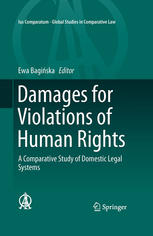

Most ebook files are in PDF format, so you can easily read them using various software such as Foxit Reader or directly on the Google Chrome browser.
Some ebook files are released by publishers in other formats such as .awz, .mobi, .epub, .fb2, etc. You may need to install specific software to read these formats on mobile/PC, such as Calibre.
Please read the tutorial at this link: https://ebookbell.com/faq
We offer FREE conversion to the popular formats you request; however, this may take some time. Therefore, right after payment, please email us, and we will try to provide the service as quickly as possible.
For some exceptional file formats or broken links (if any), please refrain from opening any disputes. Instead, email us first, and we will try to assist within a maximum of 6 hours.
EbookBell Team

4.8
104 reviewsThis volume analyses the legal grounds, premises and extent of pecuniary compensation for violations of human rights in national legal systems. The scope of comparison includes liability regimes in general and in detail, the correlation between pecuniary remedies available under international law and under domestic law, and special (alternative) compensation systems. All sources of human rights violations are embraced, including historical injustices and systematical and gross violations.
The book is a collection of nineteen contributions written by public international law, international human rights and private law experts, covering fifteen European jurisdictions (including Central and Eastern Europe), the United States, Israel and EU law. The contributions, initially prepared for the 19th International Congress of Comparative law in Vienna (2014), present the latest developments in legislation, scholarship and case-law concerning domestic causes of action in cases of human rights abuses. The book concludes with a comparative report which assesses the developments in tort law and public liability law, the role of the constitutionalisation of the right to damages as well as the court practice related to the process of enforcement of human rights through monetary remedies. This country-by-country comparison allows to consider whether the value of protection of human rights as expressed in international treaties, ius cogens and in national constitutional laws justifies the conclusion that the interests at stake should enjoy protection under the existing civil liability rules, or that a new cause of action, or even a whole new set of rules, should be created in national systems.